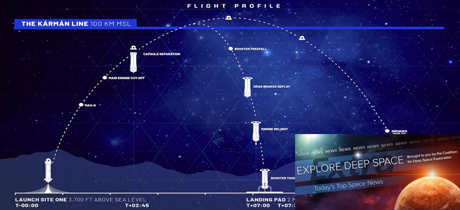In Today’s Deep Space Extra… Australia to provide rover as part of its role in the Artemis program. The James Webb Space Telescope arrives in French Guiana ahead of December launch.
Human Space Exploration
Adapter structure with 10 CubeSats installed on top of Artemis Moon rocket
Coalition Member in the News – Jacobs
Spaceflightnow.com (10/12): Teams at NASA’s Kennedy Space Center (KSC) have lifted the Orion Stage Adapter on top of the Space Launch System (SLS) deep space rocket, adding the structure housing 10 CubeSat payloads. The mounting of the circular adapter structure is one of the final steps in stacking the SLS rocket inside High Bay 3 of the iconic vehicle assembly building (VAB). The Orion spacecraft, NASA’s human-rated, next-generation deep spaceship, will be added to the rocket in the coming days to complete the build-up of the 322-foot-tall launch vehicle.
Australia to provide rover for future NASA lunar lander mission
SpaceNews.com (10/13): NASA and the Australian Space Agency announced that Australia will provide a rover that will be included on a commercial lunar lander mission no earlier than 2026 as part of the country’s role in the NASA-led Artemis lunar exploration effort. The rover would have the ability to pick up and transfer lunar regolith to a NASA-operated in-situ resource utilization (ISRU) system on a commercial lunar lander.
Russian study confirms that space travel damages your brain cells
Futurism (10/12): Published this week in the Journal of the American Medical Association Neurology, a study involving five Russian cosmonauts who lived and worked aboard the International Space Station (ISS) for five-and-a-half months suggests that human brain cells are damaged in space. The evidence surfaced in blood samples with biomarkers that were collected and assessed upon their return to Earth. The lead researcher, a neuroscientist from the University of Gothenburg in Sweden, states that further study is warranted as are efforts to prevent the damage.
Space Science
NASA’s James Webb Space Telescope arrives in French Guiana ahead of December 18 launch
Coalition Member in the News – Northrop Grumman
Space.com (10/12): Scheduled for launch on December 18, the James Webb Space Telescope (JWST) arrived at its launch site in French Guiana on Tuesday, after sailing by ship for 16 days. The shipment followed pre-launch testing and final assembly at Northrop Grumman facilities in Redondo Beach, California. Lots of careful preparations for liftoff remain. Once launched on an Ariane V rocket, the JWST will travel to the second Lagrange point or L-2, one million miles away from the Earth.
Auroras in the USA
Spaceweather.com (10/12): A solar coronal mass ejection reverberated through the Earth’s magnetic field early Tuesday, sparking a red topped auroral, display the first seen as far south as Massachusetts since 2017 and reported to be visible as far south as Nebraska.
Other News
UAE appoints new director-general of national space agency
SpaceNews.com (10/12): The United Arab Emirates (UAE) has a new director general of its space agency, Salem Butti Salem Al Qubaisi. He replaces Mohammed Nasser Al Ahbabi, who has served since the agency’s founding in 2014. The change was to align the agency’s leadership with a new 50-year national space strategy.
Astra completes investigation and schedules next orbital launch attempt
NasaSpaceflight.com (10/12): On August 28, Astra conducted a test flight of Rocket 3.3, the latest version of their small satellite launch vehicle. Designated LV0006, the rocket ignited all five of its Delphin first stage engines and lifted off from the Pacific Spaceport Complex in Kodiak, Alaska. One second after liftoff, one of the Delphin engines shut down. Astra has completed an investigation into the failed launch, which determined propellant leak caused the engine failure at liftoff, resulting in insufficient thrust to achieve orbit.
‘Captain Kirk’ heading to space on Blue Origin’s second human launch
Today.com (10/13): Blue Origin’s NS-18 suborbital New Shepard is set to launch from West Texas today at 10 a.m. EDT, with William Shatner, Star Trek’s Capt. James T. Kirk and in real life at 90 years the oldest person to cross the boundary into space. He’s called the prospect “life changing,” while awaiting the 10-minute flight he will share with three others.

